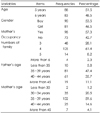Abstract
This study was conducted to investigate the food behavior during the childhood, the influence of food behavior on internalizing and externalizing behavior problems, and the pattern of influence of food behavior on behavior problem depending on children's age and gender. A total of 171 children aged 5 and 6 years were selected who attended 3 nurseries and 1 kindergarten in Seoul, and the survey data responded by teachers were analyzed. The results were as follows. First, children with higher levels of food behavior showed less internalizing behavior problems compared to those with lower levels of food behavior. The main effects and interaction of gender and age were not significant. Second, children with higher levels of food behavior showed less externalizing behavior problems compared to those with lower levels of food behavior. For hyperactivity, interaction of age and food behavior was significant, and age and the interaction of age and food behavior affected children's agression. Food behavior of children affects behavior problem and, therefore, children with better food behavior showed less behavior problems in the same circumstances.
Figures and Tables
Table 2
Mean and standard deviation of internalizing behavior problem of children by age, gender, and food behavior

Table 4
Mean and standard deviation of externalizing behavior problem of children by age, gender, and food behavior

References
1. Nam SM. The relationship between the eating habits of elementary school students and parenting behavior characteristics. Korean J Food Cult. 2003. 18(6):515–526.
2. Lee MH, Chung EJ, Hwang HS, Kim JH, Sung MY, Kwon KM. Health and nutrition education for young children. 2009. Suhaksa.
3. Jeong YH. The influence of mother's food habit, food ideology, and perception of body image in preschool children's nutrient intake [MS thesis]. 2005. Daegu: Keimyung University.
4. Park SY. S study on food habits and food preference of preschool children [MS thesis]. 2008. Masan: Kyungnam University.
5. Min IJ. Eating behaviors, development, and mother and teacher's attitudes and knowledge of nutrition [MS thesis]. 2009. Seoul: Kyung Hee University.
6. Kim YJ, Chung SJ, Han YS, Lee YN, Lee SI, Byun KW, Choi HM. The characteristics of infants' temperament, maternal feeding behavior and feeding practices in picky eaters. Korean J Community Nutr. 2005. 10(4):462–470.
7. Ohm JA. Relationship of eating behavior with social competence and attention deficit hyperactivity of children. Ewha Educ Res. 2003. 34(2):57–71.
8. Kim KA, Shim YH. Cognitive performance and hyperactivity in terms of eating behavior and physical growth among preschoolers: - 2. The relationships of several factors (nutritional and social factors, cognition and hyperactivity) on preschoolers-. Korean J Food Cult. 1995. 10(4):269–279.
9. Galensky TL, Miltenberger RG, Stricker JM, Garlinghouse MA. Functional Assessment and Treatment of Mealtime Behavior Problems. J Posit Behav Interv. 2001. 3(4):211–224.

10. Yoon GL. A Study on the relationship between the eating habits and the nutrition intake status and the special personality of elementary school Students in Youngnam [MS thesis]. 2007. Daegu: Keimyung University.
11. Kim KA. Cognitive performance and hyperactivity in terms of eating behavior and physical growth among preschool-age children [MS thesis]. 1994. Seoul: Seoul Women's University.
12. Lee JM, Park HJ, Park SM. A Survey on Eating Behavior of Preschool Children for Development Snack. Korean J Food Cult. 2003. 18(2):151–159.
14. Kim HK. A Study on the Relationship between Diet and Behavior of preschool and School Children. J Hum Ecol. 2003. 4(2):71–84.
15. Kim SH, Kim KY. The causal relationship of children's behavior problem and the related variables. J Korean Home Manage Assoc. 1999. 17(1):155–166.
16. Lee Sook, Kim SM. The effects of personal and parental variables on young children's daily stress levels and maladjustment behaviors. J Korean Home Econ Assoc. 2009. 47(7):1–12.
17. Lee EJ, Min HY. Influence of parents' parenting values and beliefs on preschoolers' problem behaviors. Korean J Hum Ecol. 2006. 15(4):541–549.
18. Kwon GJ. The study of mother's psychological control and children's behavior problems [MS thesis]. 2008. Seoul: Hanyang University.
19. Moon MY. The effects of children's perception of parental rising attitude on children's behavior of maladjustment [MS thesis]. 2001. Seoul: Yonsei University.
20. Han MH, Yoo AJ. The Validation of the Child Behavior Checklist. Korean J Child Stud. 1995. 16(2):5–21.
21. Kim JH, Lee SH. The Effects of Maternal Food Environment on Food Behavior and Hyperactivity of Preschoolers. J Korean Home Econ Assoc. 2004. 16(3):99–113.
22. Achenbach TM. Manual for the child behavior checklist/4-18 and 1991 profile. 1991. Dept of Psychiatry, University of Vermont;239–245.
23. Kim YJ, Han YS, Chung SJ, Lee YN, Lee SI, Choi HM. Characteristics of infants' temperaments and eating behaviors, mothers' eating behaviors and feeding practices in poor eating infants. Korean J Community Nutr. 2006. 11(4):449–458.
24. Kwon YK, Lee YN. A study on eating habit and behavior in accordance with the stress level of the elementary school students. J East Asian Soc Diet Life. 2004. 14(6):542–550.
25. Lee YM, Chung MR, Kim JH. Evaluation of eating behaviors of children in early childhood education institution. J Korean Home Econ Assoc. 1999. 37(7):69–81.
26. Marchi M, Cohen P. Early childhood eating behavior and adolescent eating disorders. J Am Acad Child Adolesc Psychiatry. 1990. 29(1):112–117.
27. Pelchat ML, Pliner P. Antecedents and correlates of feeding problems in young children. J Nutr Educ. 1986. 18:23–29.

28. Reau NR, Senturia YD, Lebally SA, Christoffel KK. Infant and toddler feeding patterns and problems; normative data and a new direction. J Dev Behav Pediatr. 1996. 17(3):149–153.
29. Joo NM, Kim SH, Park HN, Lee SY, Kim MJ, Jung KS. The Effect of Snack Intake of Preschoolers on ADHD. Korean J Food Cult. 2006. 21(2):193–201.




 PDF
PDF ePub
ePub Citation
Citation Print
Print







 XML Download
XML Download